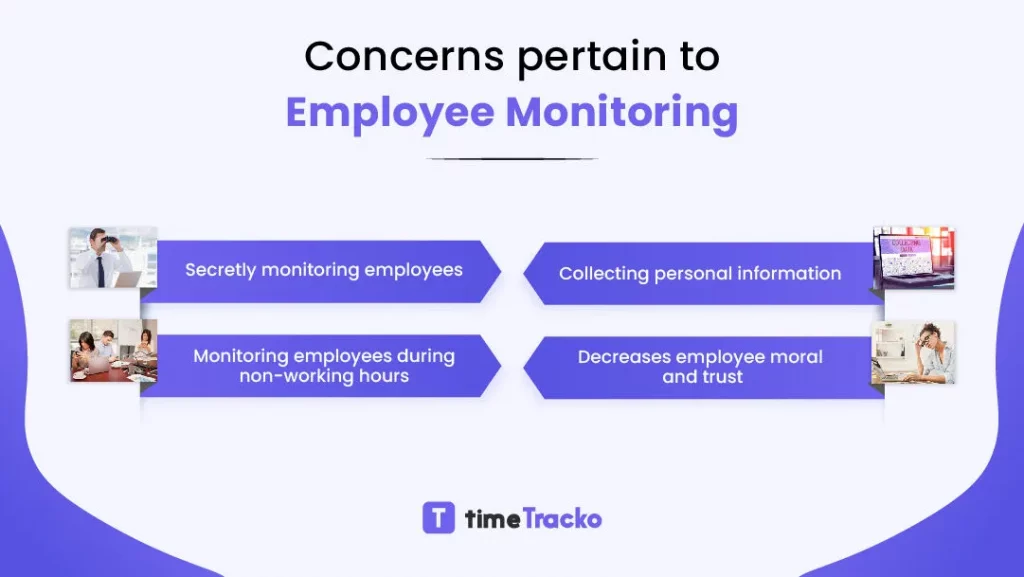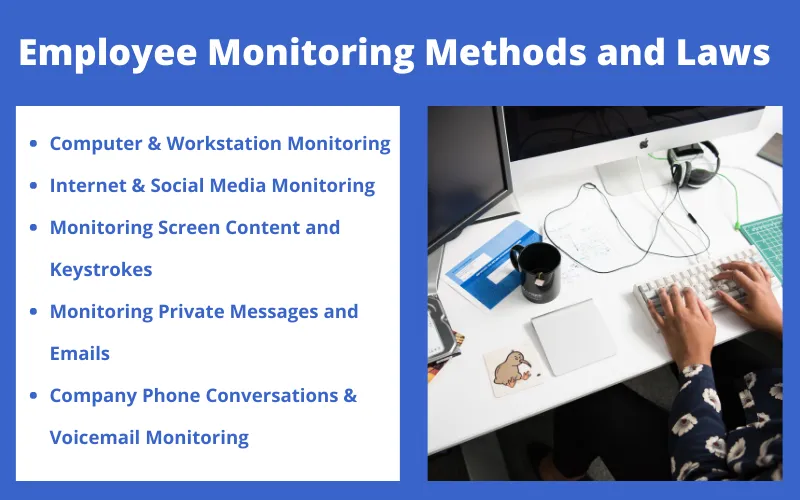Is Employee Monitoring Legal?
Is Employee Monitoring Legal?
Employers do employee Monitoring to observe their staff members and monitor their whereabouts and activities.
Employee Monitoring software monitors employees, time clocks, video surveillance, GPS units, and biometrics.
As an example, video surveillance can increase the security and productivity of your business. When caught on camera, the clips can certainly prevent thefts.
Why and How Do Companies Monitor Their Employees?
When all the employees work better together, the company will rise. So, employers always look for ways to motivate their workers and increase productivity.
But while employers are doing so, some employees are not devoted to their work; instead, they are lazy and less productive.
In my personal experience, I’ve sat at my work desk alongside a co-worker who came to the office and watched their social media throughout the day.
When the manager asked about work, there was always a likely reason: Sometimes sickness, other times family issues, or some personal issues.
Thus, employers monitor their employees to monitor whether they work effectively and focus on their work. Also, companies monitor their employees for safety purposes.
They watch over confidential data and information that an employee might share with other companies or people.

Companies implement various methods for employee monitoring. Some of them are:
Let’s take a quick look at the employee monitoring methods used commonly:
- Observing computers, workstations, and personal devices
- Observing internet and social media usage
- Observing screen content
- Watching private messages and email
- Recording and listening to phone conversations & voicemail
- Monitoring video and audio
Can an Employer Watch Employee’s Computers?
Naturally, employers can monitor their employees’ work. If you feel like your boss monitoring your computer is obsessive, you must talk to them.
Feel free to talk and ask whether your performance is not good or some other reason they’re watching you.
If you are told that you are deficient somehow, you should request a one-to-one to discuss the issue. You might also explain that you are not used to being monitored so closely when you work as an adult.
When it becomes so distracting, you can tell the boss that you cannot perform your tasks when you know he’s watching everything you do.
Is Monitoring Employees Legal in the US and Europe?
Yes, most employee monitoring methods are legal in the US and Europe.
In the US, federal legislation states that employers can monitor employees without knowing.
However, if your employee knows that they are being watched, they will be conscious all the time. They will not do things they are not supposed to, and they will not be confused by the monitoring process.
When they know that their on-office activities are transparent, they will increase their productivity. In Europe, employee monitoring is legal, but the monitoring policies are acceptable per GDPR laws.
What is GDPR?
GDPR stands for General Data Protection Regulation. GDPR applies to all organizations operating in the European Union.
The European Union implemented the GDPR rule to ensure that companies remain accountable. This rule ensures that employees get notified when collecting their data.
Also, companies can safeguard the personal information that they collect from their employees by the data collection methods.
Employee Monitoring Methods and Laws Associated With Them

1. Computer & Workstation Monitoring
Monitoring computers and workstations mean watching the employee’s computer and workstation during office hours.
Most companies view the worker’s internet usage, their inactivity during work, and shared documents.
Employers monitor the computers and workspaces to keep information on how the employee is accessing the company’s devices.
Monitoring device usage will prevent the misuse of devices, leading to complications in the future.
US Laws for Computer & Workstation Monitoring
According to the ECPA (Electronic Communications Privacy Act), a company can monitor their devices, i.e., laptops and desktops, that the company owns.
Even if you’re a remote worker and use a laptop provided by your office, your managers can monitor the device.
GDPR Rules for Computer & Workstation Monitoring
Computer monitoring is okay, but employees should know that they are being watched. While monitoring the computer and workspace, a company should only protect employees’ right to privacy and monitor employees for legitimate business purposes.
2. Internet & Social Media Monitoring
Companies monitor employees’ computers and work desks. Watching internet usability is a part of computer and work desk monitoring.
Some employees tend to become active on their social media accounts during office hours.
Companies monitor their employees’ internet and social media usage to ensure their employees don’t waste their time watching random videos on Facebook.
Additionally, this is done to prevent your employees from accessing potentially risky sites.
US laws for the Internet and Social Media Monitoring
It’s legal in the United States for companies to create their own social media policies. The company has the right to know if you use the web for inappropriate purposes during work hours.
A company can set its own social media rules. The company can set rules on which sites the employee can use during office hours.
They can also set rules on what an employee can post about their office and employer. As federal labor laws protect wages and working conditions, most employer policies can’t prohibit their discussion.
There is a rule that employers can ask for their employees’ social media account details in some states. However, this does not apply in every state.
GDPR Rules for Internet and Social Media Monitoring
The GDPR does not specify any rules for monitoring the internet & social media use at the workplace.
3. Monitoring Screen Content and Keystrokes
Screen monitoring and keystroke monitoring are the standard employee monitoring method during working hours.
Screen and keystroke monitoring are generally done using a monitoring app or software. Companies have their software, or they buy employee monitoring software.
The monitoring software records the screen activities of an employer’s computer and saves screenshots at a specific time interval.
Also, the software watches an employer’s keystrokes and notifies when there is a long gap or breaks during working hours.
Organizations use screen and keystroke monitoring for data protection as well. Companies can keep track of who is watching their data and information.
Also, when anyone sends confidential data and information about their workplace, the act is detectable.
US Laws for Screen Content Monitoring and Keystrokes
In the US, it’s legal for employers to monitor their employees’ screen activities and keystrokes.
Nevertheless, since this method of employee monitoring is so intrusive, it’s recommended that you solicit your employees’ consent first.
Using tools that run secretly on a worker’s computer can set you up for legal issues in the future.
GDPR Rules for Monitoring Screen Content & Keystrokes
Data privacy is at the heart of GDPR. For this reason, most employers prohibit the use of tools that record keystrokes or take screenshots of employee screens.
It is considered too damaging to employees’ privacy, even for company equipment.
4. Monitoring Private Messages and Emails
This is another standard method for monitoring employees, but it is controversial. It is common for companies to monitor employee emails and track private company messages on company equipment.
In the same way as keystroke logging, this is done for security purposes. Knowing your employees’ interactions with other people can help you manage sensitive information better. Using this method, you can avoid potential data breaches.
US Laws for Private Messages and Email Monitoring
Emails and other private messages exchanged or received on company-owned devices are seen as company property.
Due to this, companies can also monitor private email and text messages. Nevertheless, your company should be very forthcoming about tracking and seek employee consent as this may be seen as a significant breach of employee privacy, especially in light of the strict regulations imposed by US data privacy laws.
GDPR Rules for Private Messages & Email Monitoring
There is no direct mention of email monitoring in the GDPR.
It, however, has a few privacy protections to follow.
Monitoring of emails is permitted if these conditions satisfy:
- Employees are aware of and consent to monitor.
- Your employees’ email accounts contain any personal information you need to obtain and share with their consent.
- After the retention period expires, employers should delete all emails.
5. Company Phone Conversations & Voicemail Monitoring
The goal of monitoring corporate phone conversations and voicemail is more than just listening to them. In addition, it may be necessary to record these conversations.
The goal is to protect the company against possible data breaches by monitoring emails. Having control over who your employees talk to and what they share will allow you to control how your data is used.
US Laws for Company Phone Calls & Voicemail Monitoring
A company can monitor calls and voicemails only for legitimate business purposes, and it cannot be evident if employees are not using separate personal and business phones.
Keep in mind if the phone belongs to the company, you have the right to monitor its usage.
The ECPA does, however, have an important exception. Employers must stop monitoring their employees’ calls when they realize they are personal.
Additionally, many state and federal laws enforce the “prior-consent exception.”
Any conversation that is recorded requires prior consent. Other states, such as Maryland, require all involved in the conversation to consent to the conversion.
If you want to record a group meeting with six members, each one must give consent before you do it; otherwise, it is illegal.
GDPR Rule for Company Phone Calls & Voicemail Monitoring
Because conversations and voicemail are considered personal data under GDPR, to record, the participant must expressly consent to give oral consent during a telephone call.
Can Employer Monitor Employees’ Personal Devices?
Many employees, incredibly remote workers, use their devices for work. Can employers monitor employees’ devices that they use for office work?
As long as an employer has clearly defined policies governing the surveillance of personal devices, on-site monitoring of devices can be permitted. BYOD (Bring-Your-Own-Device) policies are considered in this situation.
BYOD is an employment contract, agreement, or onboarding document. Employers can gather data on employees’ devices when they have a clear BYOD policy.
However, since BYOD applies for business and personal use, data monitoring methods can’t be too intrusive.

 in Melbourne
in Melbourne 
 Employee Screen Monitoring Software
Employee Screen Monitoring Software App and Website Monitoring Software
App and Website Monitoring Software Time and Attendance Software
Time and Attendance Software Finance
Finance Banking
Banking Healthcare
Healthcare Lawyers
Lawyers Retail & ecommerce
Retail & ecommerce Knowledge base
Knowledge base Blogs
Blogs Installation Guide
Installation Guide FAQs
FAQs About
About Media Kit
Media Kit Contact us
Contact us